大学英语四级备考笔记知识点汇总
大学英语四级知识点

大学英语四级知识点大学英语四级考试对于许多大学生来说是一个重要的关卡。
想要顺利通过四级考试,掌握相关的知识点是关键。
以下将为大家详细介绍一些重要的大学英语四级知识点。
一、词汇词汇是英语学习的基础。
在四级考试中,大约需要掌握 4500 5000个词汇。
建议通过多种方式来记忆词汇,比如利用单词书、手机 APP 等。
1、词根词缀记忆法很多单词都有共同的词根或词缀,了解这些可以帮助我们推测单词的意思。
例如,“un”表示否定,“able”表示能够,那么“unable”就是“不能”的意思。
2、语境记忆法将单词放在具体的句子或文章中记忆,这样不仅能记住单词的意思,还能了解其用法。
3、联想记忆法把单词与生活中的事物、场景或自己熟悉的东西联系起来,形成独特的记忆点。
二、语法语法知识在四级考试中也占据重要地位。
1、时态英语中有十六种时态,四级考试中常见的有时态有一般现在时、一般过去时、现在进行时、过去进行时、现在完成时、过去完成时等。
需要清楚每种时态的构成和用法,以及不同时态之间的区别。
2、从句包括定语从句、宾语从句、状语从句等。
要掌握各类从句的引导词、语序和用法。
3、虚拟语气这是一个较难的语法点,需要了解不同情况下虚拟语气的构成和使用规则。
三、听力听力部分在四级考试中占比较大。
1、提前浏览选项在听力开始前,要迅速浏览选项,对题目内容有一个大致的了解,这样在听的过程中可以更有针对性。
2、抓住关键信息注意听力中的数字、时间、地点、人物等关键信息。
3、多听多练可以通过听英语新闻、电影、歌曲等来提高听力水平。
四、阅读阅读理解是四级考试的重点。
1、快速阅读学会快速浏览文章,抓住主旨大意。
2、定位关键词根据题目中的关键词在文章中定位相关信息,提高答题效率。
3、理解长难句掌握分析长难句的方法,理解句子的结构和意思。
五、写作写作部分需要注意以下几点:1、审题清晰明确题目要求,确定写作的主题和体裁。
2、结构合理一般采用三段式,开头引出主题,中间阐述观点和论据,结尾总结升华。
英语四级知识点总结

英语四级知识点总结英语四级考试是一项常见的英语水平考试,要求考生具备一定的英语听、说、读、写能力。
下面是英语四级考试中常见的知识点总结,希望对大家的备考有所帮助。
一、词汇知识点1. 同义词与反义词。
例如:happy - glad, sad - unhappy。
2. 常用词汇的拼写与读音。
例如:Wednesday, February。
3. 熟悉常用的常见词汇,如颜色、数字、季节、动物等。
二、语法知识点1. 时态。
掌握一般现在时、一般过去时、一般将来时等时态的用法。
2. 语态。
了解主动语态和被动语态的变换及用法。
3. 从句。
了解名词性从句、定语从句、状语从句的用法。
4. 单复数。
掌握名词、动词、代词等的单复数形式。
5. 连词。
熟悉常见的连词用法,如并列连词、转折连词等。
6. 形容词与副词。
掌握形容词和副词的用法及比较级和最高级的形式变化。
三、阅读理解1. 掌握阅读理解的技巧,如扫读、略读、精读等。
2. 理解文章的大意和细节信息。
3. 掌握寻找关键词和主题句的方法。
4. 注意推理和推断,特别是根据上下文推断词义。
四、写作技巧1. 掌握写作的基本句型和表达方式。
2. 增加词汇量,提高句子的表达能力。
3. 练习写作各类题型,如图表作文、观点对比、描述事件等。
4. 注意时态、语态和语法的正确使用。
五、听力技巧1. 提高听力理解能力。
2. 注意听清关键信息,如数字、时间、地点等。
3. 练习听懂不同口音和语速的英语。
六、口语表达1. 增加口语词汇量,提高口语表达能力。
2. 练习口语的听说能力,如对话、问答等。
3. 注意语音、语调和语速的正确运用。
以上是英语四级考试常见的知识点总结,希望能够对大家的备考有所帮助。
另外,备考过程中要多进行模拟测试,提高应试能力,同时也要注意积累语言实际运用能力,灵活应对各种题型和情境。
最重要的是多进行实践,多进行口头和书面的练习,提高语言的应用能力。
祝愿大家取得好成绩!。
大学英语四级知识点总结

大学英语四级知识点总结大学英语四级知识1as…as1.基本用法该结构的基本意思是“与……一样”,其中接形容词或副词的原级,在否定句中,第一个as也可换成so.如:He doesn't study as [so] hard as his brother. 他学习不如他弟弟努力。
2.涉及数量或程度的用法若涉及数量或程度,可用“as much+不可数名词+as”和“asmany+可数名词复数+as”。
如:He doesn‘t pay as much tax as we do / as us. 他没我们交的税款多。
There are not as many restaurants as there were. 现在餐馆没有过去多了。
3.有关词序的一点说明其间接形容词时,有时该形容词还可修饰另一名词,但这个名词应带有不定冠词(注意词序)。
如:I have as good a voice as you. 我的声音和你一样好。
4.该结构的修饰语根据情况可用(not) nearly, almost, just, nothing like, exactly, not quite, half, one-ten, twice, threetimes, 30 per cent等修饰,并且这些修饰语必须置于第一个as之前,而不能置于其后。
如:This room is twice as large as that one. 这个房间是那个房间的两个大。
You‘re not half as clever us you think you are. 你远不是自己想像的那么聪明。
It took three times as long as I had expected. 这件事比我预料的多花了两倍的时间。
大学英语四级知识2first & at first1、从词性上看区别first可用作形容词或副词,有时还可用作代词;而at first 作为介词短语,只起副词用作用(在句中用作状语)。
英语四级必备语法知识点总结归纳
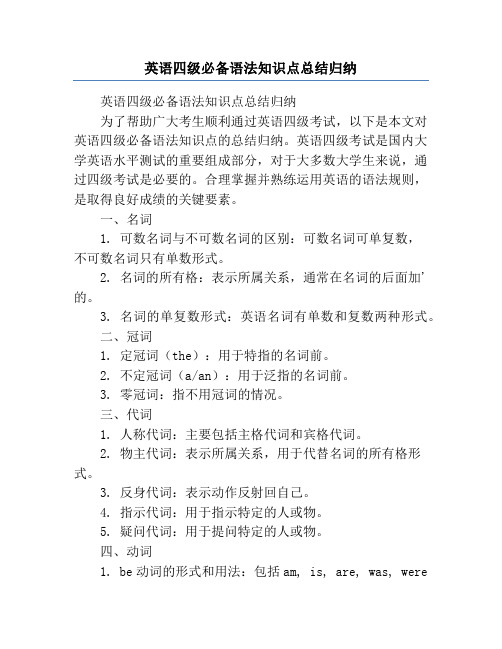
英语四级必备语法知识点总结归纳英语四级必备语法知识点总结归纳为了帮助广大考生顺利通过英语四级考试,以下是本文对英语四级必备语法知识点的总结归纳。
英语四级考试是国内大学英语水平测试的重要组成部分,对于大多数大学生来说,通过四级考试是必要的。
合理掌握并熟练运用英语的语法规则,是取得良好成绩的关键要素。
一、名词1. 可数名词与不可数名词的区别:可数名词可单复数,不可数名词只有单数形式。
2. 名词的所有格:表示所属关系,通常在名词的后面加'的。
3. 名词的单复数形式:英语名词有单数和复数两种形式。
二、冠词1. 定冠词(the):用于特指的名词前。
2. 不定冠词(a/an):用于泛指的名词前。
3. 零冠词:指不用冠词的情况。
三、代词1. 人称代词:主要包括主格代词和宾格代词。
2. 物主代词:表示所属关系,用于代替名词的所有格形式。
3. 反身代词:表示动作反射回自己。
4. 指示代词:用于指示特定的人或物。
5. 疑问代词:用于提问特定的人或物。
四、动词1. be动词的形式和用法:包括am, is, are, was, were等。
2. 一般现在时:表示经常性或普遍性的动作。
3. 一般过去时:表示过去发生的动作或状态。
4. 一般将来时:表示将来要发生的动作或状态。
5. 动词的时态:包括现在进行时、过去进行时、将来进行时等。
6. 动词的语态:包括主动语态和被动语态。
五、形容词和副词1. 形容词和副词的比较等级:用于表示不同程度的级别。
2. 形容词修饰名词:通常形容词位于名词的前面。
3. 副词修饰动词或形容词:通常副词位于动词或形容词的前面。
六、介词1. 表示位置关系:用于描述物体之间的位置关系。
2. 表示时间关系:用于描述事件或活动的发生时间。
3. 表示方式和手段:用于描述做事的方式或使用的手段。
4. 表示原因和目的:用于描述事件或行为的原因和目的。
七、连词1. 并列连词:用于连接同等重要的两个句子或成分。
英语四级笔记(珍藏版)
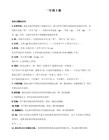
短对话部分短对话听力的一些原则1.推理原则:一般需对对话进行推理,故直接在对话中听到的一般不是正确答案。
2.挫折原则:通常要办的事情都是不顺利的(如买东西买不到,订房间客满等)3.男女原则:一般男生比较衰,女生比较牛。
男生提出的观点女生都是不同意或有不同看法的,反之女生提出的观点男生都是同意和赞赏的。
男生的特征:脏、乱、差、浪费、穷、小气、不良习惯、迟钝、不顾家女生的特征:爱干净、节约、富有、好学、能干、聪明、大度、耐心、恋家、除数理化外成绩都很好4.父母一般只有一个作用教育子女好好学习5.除了父母教育子女外,家里(包括朋友家,阿姨家等等)发生的事情一般是不考的,故遇到地点推测题类似at home / at Mary’s home之类的选项一般都是不对的。
6.四级听力短对话只考日常生活学习中遇得到事情,问题,故如果选项中出现一些日常生活中不太可能发生或很少发生的事情一般不会是正确选项短对话十大场景及一般思路1.借车:车一般是借不到的2.吃:匹萨,海鲜吃了一般会有不适反应,―派‖一般比较好吃3.考试:作业、论文一般比较难,或须要熬夜教授一般比较严厉选修课较难较多4.坐车(飞机、轮船):一般都需要等5.事故(灾难):光明原则,一般不会死人6.听讲座:题目一般是比较有趣丰富的,内容一般是比较复杂难懂的7.论文:一般需要修改(polish)或重写(rewrite)8.休闲:男生一般喜欢待在家里看TV或者看moive,女生一般喜欢高雅艺术如theater9.医院:需要预约make an appointment10买票:基本上是买不到的短对话的常见场景1.学校场景课程分类Optional course 选修课Required course 必修课Day course 白天的课Evening course 晚上的课经常出现的科目或专业Chinese 中文English 英语mathematic 数学history 历史chemistry 化学Literature 文学考试Final exam 期终考试middle exam 期中考试make up 补考test测验pop test 事先没有说好的测验quiz 测验oral test 口试考试临近draw on / in sight of / draw nearly考试延期或取消delay / be off / defer / hold up / postpone / put off / suspend学校分类public school 公立学校private school 私立学校religious school 教会学校学校中的人president 校长dean 院长professor 教授lecturer 讲师coordinator 管理员doctor 博士master 硕士bachelor 学士freshman 大一新生sophomore 大二学生junior 大三学生senior 大四学生图书馆借书lend / borrow / check out参考书reference book续借renew过期overdue还书return罚金fineattend / have a lecture 上课cut a class 逃课miss a class 错过了课scholarship 荣誉奖学金assistantship 助教奖学金teaching assistant 助教research assistant 助研semester 学期2.交通运输场景fare 车票licence 驾照rush hours 高峰时间traffic jam 交通堵塞overtake 超车one way street 单行道over speed 超速police officer 交警ticket 罚单fine 罚金fast way / express way / high way 高速公路motor way 机动车道super way 飞机机动车道free way 免费高速公路交通工具(出现频率从高到低)plane / train(女)/ bus / bike(女)/ walk (女)/ taxi(女):女生比较喜欢tunnel / channel 隧道ring road 环线subway(美)/ underground (英)地铁metro 地道地铁underpass人行地道overhead 轻轨flyover 人行天桥mag – lev 磁悬浮take a taxi 乘出租车call a taxi 招出租车/订出租车catch a train / bus 赶火车/汽车3.电话场景mobile phone 手机pay phone 公用电话telephone box/booth 电话亭yellow page 黄页dial (拨电话号码)/ press (按电话号码)extension 分机operator 总机put~through 接通wrong number / there is no one by this name 电话号码错了/ 没有这个人is not in 不在?be not inhold on 不要挂断,稍等take/leave a message 留言hang up / get off 挂断credit call 记账式电话bill the call into the 3rd party 免费电话collect call 对方付费电话4.机场场景plane / craft 飞机book 订票timetable 时间表destination 目的地open ticketone way ticket 单程票round trip ticket 来回票non-stop / direct flight 直航transfer / lay over / stop over 转机first / business / economy cabin 头等/ 商务/ 经济舱confirm the flight 确认航班check in 登记boarding card 登机牌security check 安检see off 送行送别时的祝语keep in touch 保持联系safe landing 安全着陆board 登机take off 起飞departure 离港safety / sect belt 安全带land 着陆arrival 进港pick up 接机5.公司场景job vacancy有空缺职位letter of application 求职信resume 简历resume包括几部分basic / personal info. 基本信息/个人资料academic background 教育背景work experience 工作经验certificates and honoursinterview 面试offer 聘用信work experience 工作经验work overtime 加班ask for a raise 加钱wage 周薪salary 日薪bonus奖金allowance 津贴annual income 年收入promotion 升职fire 解雇resign 辞职retire 退休laid-off 下岗work / job / career / course 工作post / position / vocation / title 职务假期休息的说法(依次是从大到小)holiday 假日,假期vacation 休假annual leave 年假sick leave 病假rest 休息break 指喝杯茶、喝杯咖啡的休息coffee break away 离开一会公司职位从大到小chairman of the boardpresident -- general manager—manager – department manager—head – officer – specialist(专员)-- clerk6.租房场景live on campus 住校live off campus 住校外for sale 可销售的房子for rent / lease 可出租的房子to let 同上rent 租金utilities 公用事业费location 位置suburb / downtown 市郊/ 市中心condition 住房条件furnished 配家具unfurnished 无装修leaking 漏水blackout 断电environment 环境transportation 交通land lord 房东land lady 房东太太tenant 房客roommate 室友好的室友:neat 整洁的considerate 体贴的,细心的不好的室友:messy / untidy 脏乱的noisy 吵闹的7.医院场景see a doctor 去医院看医生send for a doctor 让医生出诊health center / clinic 卫生所/ 门诊部physician 内科医生surgeon 外科医生dentist 牙医make an appointment 预约emergency 急诊check up / exam 检查cold(感冒)—— flu (流感)—— headache (头痛)—— sore throat(嗓子痛)——fever(发烧)——toothache(牙疼)——stomachache (胃疼)prescribe 开药方pill / tablet 药片liquid 喝药水injection => shot 注射operation 手术medical result 诊断结果8.宾馆场景make a reservation 预订房间confirm a reservation 确认预订cancel a reservation 取消预订fully booked / full up / full 客满porter 行旅员tips 小费reception 前台check in 登记入住single room 单人房double room 一张大床的双人房twin room 两张单人床的双人房suite 套房bathroom toilet / w.c closet restroom 厕所room service 客房服务(四级听力中的客房服务一般只有考一种——送餐)lounge 男士用休息区lobby 大堂business center 商务中心salon 美容厅ball 舞厅bar 酒吧night club 夜总会check out 退房9.邮局场景post / send / mail 寄letter / mail 信registered mail 挂号信regular mail 平信airmail 航空信parcel / package 包裹telegram / cable 电报rate 费率overweight 超重postage 邮资email 电子邮件reply 回复forward 转发cc(carbon copy)抄送bcc(blind carbon copy)秘密抄送subject 主题attach 附件attachment10.饭店场景eat out 出去吃take away 外带fast food 快餐book a table 订位子waiter / waitness 服务员waitressmenu 菜单order 点菜appetizer 开胃菜main course 主食dessert 餐后甜点bill 账单service charge 服务费change 找零tips 小费keep the change 不用找零了11.其他closed 关门open 开门office hours / business hours / working hours 工作时间,营业时间关于开关power on / off 开/关turn on / off 开/关switch on / off 开/ 关(这个词只能用于与电有关的开关,不能用于水龙头之类的开关)干杯cheerspropose a toast tobottom upthe best book 最好的书圣经the best thing 最好的事情选择the last thing 最不愿意做的事情the last man 最不愿意见的人best seller 畅销的东西sell up 卖完,卖光售罄sell out卖完,卖光售罄/ 出卖朋友或原则sell off 低价处理库存商品selling machine 自动售货机selling point 卖点count the days 渴望count on = dependent / rely on depend oncount in 把……考虑在内count for nothing 一钱不值count for little 无足轻重count for much 举足轻重count down 倒计时count up 相加count up to 共计关于旅行traveljourney 陆上长途旅行trip 陆上短途旅行outing 远足stroll 散步wander 徘徊picnic 野餐camping 野营tour 周游cruise 水上短途旅行voyage 水上长途旅行关于死亡的说法没有感情色彩的:die / end up / meat one’s death / decease褒义的:pass away贬义的:kick the bucket关于和别人相处的好的说法get on with = get along (well) withbe in good term withlive in peace with关于强调point outemphasizelay / put emphasis ongive emphasis to达成协议找到出路find a way outreach an agreementreach a consensus关于―得失‖gains and lossesgive and take关于拜访drop in / at / over / bystop in / over / bycall on sbcall at / round swlook in / uppay a visit topay / make a call to关于碰见,偶遇come acrossrun intobump intohappen to meet关于花钱、花费的词Take SpendCostChargePayBuy关于水waterrunning / tap ~ 自来水fresh ~ 活水still ~ 死水pure ~ 纯净水purified ~ 净化水mineral ~ 矿泉水be used to do 被用于be used to dong 习惯于get used to doing 渐渐习惯于used to do 过去常常单复数意思不太一样的词ruin 毁灭ruins 废墟authority 权威authorities 当局brain 头脑brains 智力,智慧custom 风俗习惯customs 海关damage 破坏,损坏damages 赔偿费ground 地面土地grounds 院子,监狱manner 礼貌方式manners 外貌minute 分钟minutes 会议记录paper 纸张papers 试卷time 时间times 时代关于―调查‖researchsurvey 市场调查opinion poll 名义调查民意调查questionnaire 问卷调查investigation 很正式的调查interview 会见,访谈belong to 属于participate in 参加be engaged in 从事、参加be involved in 卷入消磨时间kill timepass timecount one’s thumbs用完、缺少run out ofbe short ofbe lack in lack of / ina little 一点not a little 很多a bit 一点not a bit 一点也没有短对话中常用单词和句型1.表示期待、希望、渴望做某事的说法expect / hope / wishbe eager / anxious /dying tolook for ward towait / yean / thirst / long forcan not waitcounting the days2.下列词语与―but‖一样含有转折的的意思actuallywellreallyin factas a matter of factto tell you the truth3.表示建议的句型how about……做……如何I heard about……我听说……If I were you ……如果我是你……It seems to me that…… 在我看来似乎……Let’s …… shall we ?让我们……怎么样?Let us …… will you ?让我们……怎么样?Sha ll I / we ……What about ……做……如何Why don’t you ……你为什么不……Why not + 动词原型为什么不……Would you like ……你要……吗?Wouldn’t …… be better / wiser做……不是更好吗?4.表示同意、附和的句型I agree with youExactlyI couldn’t agree with you more / betterI think soI ca n’t wait any minuteBelieve it or notI will …… if假如……我就会It’s my turn轮到我了我请客Why not ?You are rightI guess so 我猜也是No problem 没问题Of causeOut of question 毫无疑问So do I / me too 我也是Sure / absolutely / beautiful 当然,很好Good ideaThat sounds really nice 听起来真不错5.表示询问的句型Any questions / any thing wrong 有什么问题吗?Can you give me some ideas 可以给我一些建议吗?Do you know ……Do you want to……Do you find any wrong with 你觉得……有什么不对劲吗?How long will it take 做什么要花多久I am thinking of ……我正在考虑做……I suppose think ……我猜想……What’s your plane plan 你的计划是什么?What happens if ……如果……怎么办?What shall we do 我们该怎么做?6.表示否定的句型Actually / as a matter of fact 事实上……How can you do sth 你怎么可以……I can’t afford any disturbance 不要再烦我I couldn’t agree with youI didn’t men to我本不打算I don’t think soIt doesn’t matter 无所谓I wish ……但愿……I’d like to but我很愿意但是……I’d love to butI just can’t bearI am afraid notI am sorry but…… is not everything……不是关键no bother / why bother 不要麻烦no , thanksreallyThat’s his opinionTo tell you the truthWell , as far as I know7.表示―不得不‖have to 表示客观上不得不做某事must 主观上的必须做某事be bound tocannot buthave no choice but8.表示―迟到‖behind timebe delayed / overduebehind schedulebe late9.表示―紧张‖trembleshake all overget one’s tongue tiedhave one’s mind go blanknervous10.以下词组听到后意思取反mean to 想要……planned to 原计划……intended to 原打算……tended toused to 过去常常……11.以下句型要引起重视,重点听取,就算本身不是考点也一定直接引向考点反意疑问句( ……,didn’t y ou ?)反问句倒装句助动词do / did / doesit is …… that / who / when…… 的句型正确答案的特征1.含义肯定的不是正确选项,模糊的是正确选项意思具体的不是正确选项,概括的是正确选项意思详细的不是正确选项,抽象的是正确选项意思肤浅的不是正确选项,深刻的是正确选项2.含有一下单词的一般是正确选项neither / either / also / besides / almost / especially / possibly / probably / likely perhaps / might / may / maybe / could /can / all / none3.含有以下三种结构的一般可能是正确选项系表结构(系动词+标语表语)比较结构(……than……)复合句4.含有四级词汇替换项的一般是正确选项5.表示―同意或不同意‖,―喜欢或不喜欢‖,―应该或不应该的‖的一般为正确选项6.以下三种选项一般其中有一个可能是正确选项反意项形似项近似项7.同意项不可能是正确选项,等例排除。
英语四级的知识点总结大全

英语四级的知识点总结大全一、四级英语听力知识点总结1. 日常对话:包括日常生活中的各种场景,如购物、旅行、问路等,考察学生对日常用语的理解和运用能力。
2. 学术讲座:主要是对一些学术性话题进行讲解,考察学生对学术性话题的理解能力。
3. 新闻报道:主要是通过对新闻事件进行报道,考察学生对新闻事件的理解和分析能力。
4. 学生讲座:主要是学生们对一些话题进行讲解,考察学生对学生讲座内容的理解和分析能力。
5. 电话留言:主要是电话留言内容的理解和分析,考察学生对电话留言的理解能力。
6. 阅读理解:主要是对一些文章进行阅读理解,考察学生对文章内容的理解和分析能力。
7. 短文朗读:主要是对一些短文进行朗读,考察学生对语音、语调和语速的掌握能力。
8. 对话朗读:主要是对一些对话进行朗读,考察学生对对话中的语音、语调和语速的掌握能力。
9. 唤醒短语:主要是通过给出一些短语来唤醒学生对短语的记忆和理解能力。
10. 后续问题:主要是在听完一段对话后,提出一些问题,考察学生对对话内容的理解和分析能力。
二、四级英语阅读知识点总结1. 短文阅读:主要是对一些短篇文章进行阅读理解,考察学生对短篇文章内容的理解和分析能力。
2. 长篇文章:主要是对一些较长的文章进行阅读理解,考察学生对文章内容的理解和分析能力。
3. 文章主题:主要是通过对文章内容进行分析和理解,找出文章的主题。
4. 段落大意:主要是通过文章中的段落来找出段落的大意。
5. 词汇理解:主要是通过上下文来理解一些生词的意思。
6. 表格填写:主要是通过对一些表格进行填写,考察学生对文章内容的理解和分析能力。
7. 细节理解:主要是通过对文章内容的细节进行分析和理解。
8. 提出问题:主要是通过对文章内容进行提问,考察学生对文章内容的理解和分析能力。
9. 综合理解:主要是对一些较复杂的文章进行综合分析和理解。
三、四级英语写作知识点总结1. 日记写作:主要是对一些日常生活中的事情进行记录,考察学生对一些日常用语和语法的掌握能力。
英语四级的常见语法知识点梳理与总结
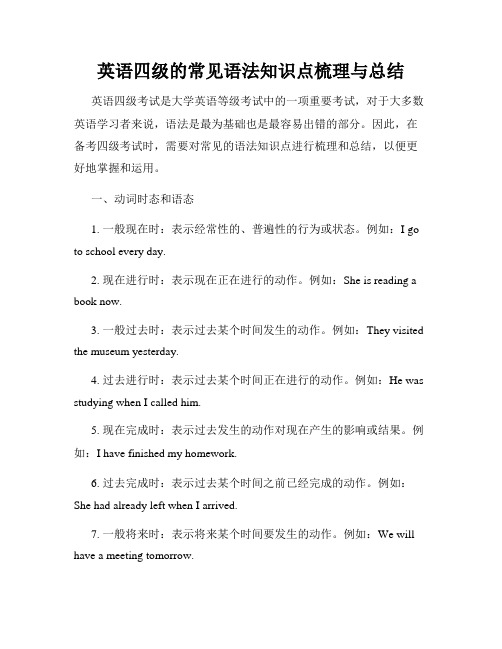
英语四级的常见语法知识点梳理与总结英语四级考试是大学英语等级考试中的一项重要考试,对于大多数英语学习者来说,语法是最为基础也是最容易出错的部分。
因此,在备考四级考试时,需要对常见的语法知识点进行梳理和总结,以便更好地掌握和运用。
一、动词时态和语态1. 一般现在时:表示经常性的、普遍性的行为或状态。
例如:I go to school every day.2. 现在进行时:表示现在正在进行的动作。
例如:She is reading a book now.3. 一般过去时:表示过去某个时间发生的动作。
例如:They visited the museum yesterday.4. 过去进行时:表示过去某个时间正在进行的动作。
例如:He was studying when I called him.5. 现在完成时:表示过去发生的动作对现在产生的影响或结果。
例如:I have finished my homework.6. 过去完成时:表示过去某个时间之前已经完成的动作。
例如:She had already left when I arrived.7. 一般将来时:表示将来某个时间要发生的动作。
例如:We will have a meeting tomorrow.二、句子成分和句型1. 主语:句子的主要动作执行者或主体。
例如:The dog is barking.2. 谓语:句子的核心动作或状态。
例如:She sings very well.3. 宾语:动作的承受者或接受者。
例如:I bought a new book.4. 表语:用来说明主语的状态、特征或性质。
例如:She is beautiful.5. 定语:修饰名词或代词的词语。
例如:The red car is mine.6. 状语:修饰动词、形容词或副词的词语。
例如:He runs fast.三、从句和连接词1. 名词性从句:可以在句子中充当主语、宾语、表语等成分。
大学英语四级必备知识点知识点汇总
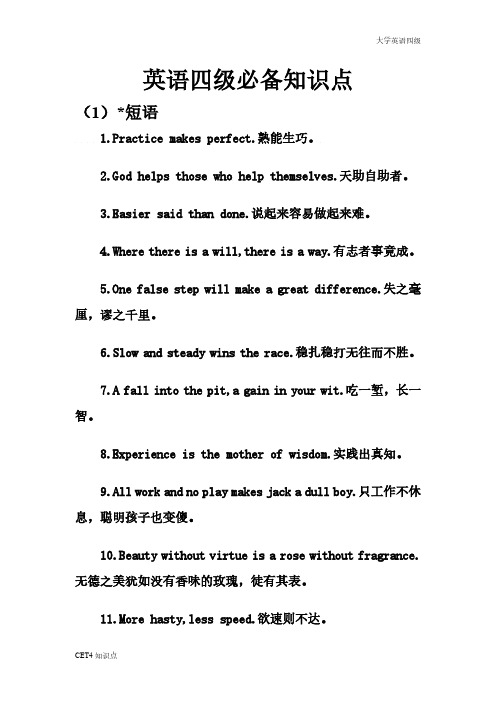
英语四级必备知识点(1)*短语1.Practice makes perfect.熟能生巧。
2.God helps those who help themselves.天助自助者。
3.Easier said than done.说起来容易做起来难。
4.Where there is a will,there is a way.有志者事竟成。
5.One false step will make a great difference.失之毫厘,谬之千里。
6.Slow and steady wins the race.稳扎稳打无往而不胜。
7.A fall into the pit,a gain in your wit.吃一堑,长一智。
8.Experience is the mother of wisdom.实践出真知。
9.All work and no play makes jack a dull boy.只工作不休息,聪明孩子也变傻。
10.Beauty without virtue is a rose without fragrance.无德之美犹如没有香味的玫瑰,徒有其表。
11.More hasty,less speed.欲速则不达。
12.It's never too old to learn.活到老,学到老。
13.All that glitters is not gold.闪光的未必都是金子。
14.A journey of a thousand miles begins with a single step.千里之行始于足下。
15.Look before you leap.三思而后行。
16.Rome was not built in a day.伟业非一日之功。
17.Great minds think alike.英雄所见略同。
18.well begun,half done.好的开始等于成功的一半。
大学英语四级知识点汇总总结

高校英语四级知识点汇总总结高校英语四级考试是中国平凡高等教育的标准化考试,对于英语进修者来说具有重要的意义。
为了援助考生更好地复习备考,以下将对高校英语四级考试的知识点进行汇总总结。
听力部分高校英语四级听力部分主要考察考生的听力理解能力,涵盖平时生活、学术、工作等各个方面的话题。
在备考时,考生需要精通以下几个方面的知识点:1. 听力场景:了解各个常见场景的相关词汇和表达,如购物、观光、约会、求职等。
2. 数字与计量:精通数字、时间、日期、价格、比例等的表达方式。
3. 人物对话:熟识不同人物的表达方式,包括礼貌用语、询问信息、提出建议等。
4. 主题词:关注不同主题之间的联系和转折,能够理解对话或讲座的主旨和要点。
阅读部分高校英语四级阅读部分主要考察考生的阅读理解能力,包括理解文章的主旨、推理作者的观点、理解词汇和句子等。
备考时,考生需要注意以下几个方面的知识点:1. 主题词:通过文章的标题、首段或段落中的关键词来裁定文章主题,把握文章的整体结构和逻辑。
2. 推理裁定:通过文章中的线索和逻辑干系来推断作者的观点和态度。
3. 词汇句法:精通常见的词汇和句子结构,犹如义词、反义词、同根词、比较级与最高级等。
4. 文化背景:了解文化差异和文化背景对文章理解的影响。
写作部分高校英语四级写作部分主要考察考生的写作能力,包括写作思路、语言表达和语法准确性。
备考时,考生需要重点精通以下几个方面的知识点:1. 写作类型:了解不同类型的写作,如图表作文、图画作文、议论文、应用文等。
2. 写作结构:精通写作的基本结构,包括引言、主体段落和结论。
3. 词汇和短语:扩展词汇量,多积累并精通一些常用的词汇和短语,以增加表达的准确性和语言的多样性。
4. 语法和句子结构:精通常见的语法知识和句子结构,如时态、语态、条件句、倒装句等。
翻译部分高校英语四级翻译部分主要考察考生的翻译能力,包括中文到英文和英文到中文的翻译。
备考时,考生需要精通以下几个方面的知识点:1. 词汇翻译:精通常见的词汇翻译方法,包括直译、意译、暗喻、类比等。
英语四级必备知识点

英语四级必备知识点英语四级是中国大陆高校英语教学水平的一种客观考试评级。
有关英语四级考试的考试大纲显示了考试的内容范围和要求。
以下是英语四级考试必备的知识点:1.词汇量:四级考试要求考生具备一定的词汇量,包括常见的单词和短语。
考生需要通过大量的阅读和听力练习来提高词汇量。
2.语法知识:四级考试重点考察英语的基本语法知识,包括时态、语态、虚拟语气、句型转换等。
考生需要了解不同语法规则的用法和搭配,以便在考试中正确运用。
3.阅读理解:四级考试常常出现多篇短文,考生需要通过阅读理解来回答问题。
阅读理解考察考生对文章主旨、细节、态度和推理的理解能力。
4.写作能力:四级写作考试通常要求考生写作一篇短文,包括议论文、说明文、应用文等。
考生需要具备表达自己观点和理由的能力,并且要注意文法和用词的准确性。
5.听力技巧:四级听力考试要求考生听懂不同场景、不同口音和语速的英语对话和短文。
考生需要通过大量的听力练习提高自己的听力技巧,如提炼关键信息、理解上下文等。
6.口语交际能力:四级口语考试考察考生的口语交际能力,考生需要在规定的时间内回答问题,表达自己的观点和想法。
考生需要通过大量的口语练习提高自己的口语表达能力。
7.多媒体辅助学习:四级考试中常常使用多媒体辅助学习,包括图片、音频和视频等。
考生需要熟悉多媒体工具的使用,如放音机、录音机、电脑等。
8.语境运用:四级考试对语言的运用进行了一定的限制,考生需要在规定的语境内运用语言,如公司、学校、饭店等。
考生需要了解不同语境下的表达方式和礼仪规范。
9.积极使用学习资源:四级考试的准备过程中,考生可以积极利用各种学习资源,如课本、教辅材料、网络资源等。
考生需要有自主学习的能力,不断扩充自己的知识和技能。
10.错误分析与纠正:四级考试的准备过程中,考生需要对自己的错误进行分析和纠正,以提高自己的英语水平。
考生可以参加模拟考试和语言学习班,通过自我评估和他人评估来找出自己的问题所在。
大学英语四级知识点汇总

大学英语四级知识点汇总一、听力1、选项特点:同类信息居多;选项信息比较全面;选项信息较长。
2、选项分析:选项考点分布广;选项词性以名词、动词、形容词为主;选项词组短语中常见的有“a bit”,“a little”,“get sth. done”,“the way to do sth.”等。
3、选项重点:要注意选项中的转折词;要注意选项中的否定词;要注意选项中的连词。
4、听前预测:在播放每段对话前,特别是在播放每个长对话前,要预览选项,通过预览选项,我们可以判断这段对话属于什么场景,会讲些什么内容。
当然,这里也要提醒大家,有好多题确实是要等到对话听完之后才能做出选择的,这类题主要是考查细节的题,做这类题有个小窍门:在播放完对话之后再预览一下选项,然后再仔细读一读对话内容,边读边对照选项,看到底哪一个选项和对话的内容相符合。
5、听中预测:在听的过程中,要注意对话中出现的同义转述。
每段对话或文章中的同义转述的词或短语毫无疑问就是本段对话或文章的重点。
因为重点的地方容易考。
如果四个选项中出现同义转述的词汇,一定要仔细听这个地方。
除了听同义转述之外,还要注意对话中那些明示或者暗示说话人通过语调变化或者转折词表明接下来的地方是考点的地方。
6、听后预测:由于听力材料播放完毕后,考生只能根据自己当时记住的对话内容进行选择答案,所以我们强烈建议考生在听力播放结束后就把答案选出来。
切勿因为相信自己刚才没有听懂的地方后续还能通过推理选对答案而拖延了第一遍就选答案的时间。
二、阅读理解1、文章特点:文章体裁以议论文、说明文为主;文章题材涉及热点话题,包括教育、科技发展、环保等。
2、阅读题型:细节题占12~13道;推断题占7~8道;主旨题占1~2道;词汇题占3~4道。
3、做题顺序:建议考生按照以下顺序做四六级阅读的题目:先认真仔细地读一遍全文(第一遍),标出生词、短语以及重要的句子(如果读不懂可以在相应的地方做个记号);通读完一遍之后,再对照题目从头到尾扫读一遍文章(第二遍),标出答案所在的相应位置;最后认真仔细地从头到尾再看一遍全文(第三遍),核实答案。
考英语四级必备知识点总结
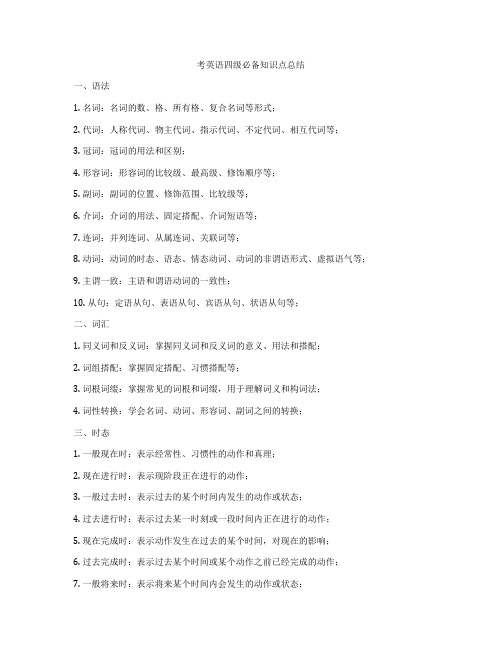
考英语四级必备知识点总结一、语法1. 名词:名词的数、格、所有格、复合名词等形式;2. 代词:人称代词、物主代词、指示代词、不定代词、相互代词等;3. 冠词:冠词的用法和区别;4. 形容词:形容词的比较级、最高级、修饰顺序等;5. 副词:副词的位置、修饰范围、比较级等;6. 介词:介词的用法、固定搭配、介词短语等;7. 连词:并列连词、从属连词、关联词等;8. 动词:动词的时态、语态、情态动词、动词的非谓语形式、虚拟语气等;9. 主谓一致:主语和谓语动词的一致性;10. 从句:定语从句、表语从句、宾语从句、状语从句等;二、词汇1. 同义词和反义词:掌握同义词和反义词的意义、用法和搭配;2. 词组搭配:掌握固定搭配、习惯搭配等;3. 词根词缀:掌握常见的词根和词缀,用于理解词义和构词法;4. 词性转换:学会名词、动词、形容词、副词之间的转换;三、时态1. 一般现在时:表示经常性、习惯性的动作和真理;2. 现在进行时:表示现阶段正在进行的动作;3. 一般过去时:表示过去的某个时间内发生的动作或状态;4. 过去进行时:表示过去某一时刻或一段时间内正在进行的动作;5. 现在完成时:表示动作发生在过去的某个时间,对现在的影响;6. 过去完成时:表示过去某个时间或某个动作之前已经完成的动作;7. 一般将来时:表示将来某个时间内会发生的动作或状态;8. 现在将来时:表示过去某一时刻之后会发生的动作;四、语态1. 主动语态:动作的执行者位于主语的位置;2. 被动语态:动作的承受者位于主语的位置;五、形容词和副词的比较级和最高级1. 比较级:两者之间的程度比较;2. 最高级:三者或三者以上的程度比较;六、虚拟语气1. 虚拟条件句:表示与现实相反的假设;2. 虚拟语气:表示与现实相反的愿望、建议、命令等;七、固定搭配和习惯表达1. 不定式的固定搭配;2. 动词短语的固定搭配;3. 习惯的表达方式;八、阅读1. 文章大意把握:对文章的主旨、中心思想有清晰的了解;2. 名词、冠词和代词的指代:注意文章中名词的指代和代词的指代;3. 语篇结构:掌握文章的段落结构和句子结构;4.常见题型:主旨大意题、细节题、推断题、态度观点题等;九、写作1. 作文基本结构:包括引言、正文、结论;2. 句子结构:掌握句子的简单、复合、并列等结构;3. 衔接词和过渡句:上下文之间的衔接;4. 写作技巧:逻辑、严密的论述,正反两方面的看待问题等;以上就是英语四级必备知识点的总结,通过对以上知识点的掌握和练习可以有效地提高英语能力。
大学英语4级语法笔记

大学英语4级语法笔记
1. 主谓一致
- 主语和谓语在人称和数上保持一致。
- 当主语是单数第三人称时,谓语动词要加s。
- 当主语是复数时,谓语动词不加s。
2. 动词时态
- 一般现在时:表示经常性或惯性的动作。
- 现在进行时:表示现在正在进行的动作。
- 一般过去时:表示过去某个时间发生的动作。
- 过去进行时:表示过去某一段时间内正在进行的动作。
- 现在完成时:表示过去某个时间发生的动作对现在造成的影
响或结果。
- 过去完成时:表示过去某个时间发生的动作对过去的另一个
时间或动作造成的影响或结果。
3. 形容词和副词的比较级和最高级
- 比较级:注意形容词和副词在比较级前面要加上more或less。
- 最高级:注意形容词和副词在最高级前面要加上the most或the least。
4. 名词所有格
- 表示属于关系时,在名词后面加's。
- 表示复数名词所有格时,在名词后面加'。
5. 祈使句和感叹句
- 祈使句表示命令、请求或建议,一般用动词原形。
- 感叹句表示惊讶、赞叹等情感,常以What、How等引导。
6. 介词的用法
- 介词用于表示位置、时间、方式等关系。
- 常用的介词有in、on、at、under、over等。
以上是大学英语4级语法的一些基础知识点,请在学习和写作时注意运用。
大学英语四级复习重点

大学英语四级复习重点大学英语四级考试对于许多大学生来说是一个重要的关卡。
想要顺利通过四级考试,掌握复习重点至关重要。
以下是为大家梳理的大学英语四级复习重点,希望能对大家有所帮助。
一、词汇词汇是英语学习的基础,也是四级考试的重点。
建议大家每天背诵一定量的单词,可以使用单词书或者手机 APP 来辅助记忆。
在背诵单词时,不要仅仅记住单词的拼写和意思,还要了解其用法和搭配。
例如,“abandon”这个单词,不仅要知道它是“放弃”的意思,还要知道“abandon oneself to”是“沉溺于”的意思。
同时,可以通过阅读英语文章来巩固所学的单词。
在阅读过程中,如果遇到不认识的单词,先不要急于查字典,可以根据上下文猜测单词的意思,这样有助于提高阅读理解能力和词汇量。
二、听力听力在四级考试中占比较大,因此要给予足够的重视。
首先,要多听历年四级真题的听力材料,熟悉考试的题型和语速。
在听的过程中,可以尝试边听边做笔记,记录一些关键信息,如时间、地点、人物等。
平时也可以通过听英语新闻、电影、歌曲等来提高听力水平。
听英语新闻可以帮助我们了解时事,同时也能学习到正式的英语表达方式;看英语电影可以让我们在轻松的氛围中感受英语的魅力,提高听力和理解能力;听英语歌曲不仅能放松心情,还能锻炼听力和语感。
三、阅读阅读理解是四级考试的重点和难点。
在复习阅读部分时,要掌握阅读技巧,提高阅读速度和理解能力。
首先,要快速浏览文章的标题、开头和结尾,了解文章的大致内容和主题。
然后,仔细阅读文章,注意文章中的关键词、句和段落。
在阅读过程中,如果遇到不理解的单词或句子,不要过于纠结,可以先跳过,继续阅读后面的内容,通过上下文来理解其含义。
做完阅读题后,要认真分析错题,总结答题技巧和规律。
同时,要多读一些英语课外书籍、杂志等,扩大阅读量,提高阅读能力。
四、写作写作是四级考试中比较容易得分的部分,但是要想取得高分,需要平时的积累和练习。
首先,要掌握不同类型作文的写作格式和框架,如议论文、说明文、记叙文等。
英语四级重点单词笔记

英语四级重点单词笔记1. abandon: to give up or leave behind, to desertExample: The explorers had to abandon their ship and swim to shore.2. ability: the power or skill to do somethingExample: She has the ability to speak five different languages.3. absorb: to take in or soak upExample: The sponge absorbs water quickly.4. abuse: to use something for the wrong purpose or treat someone badlyExample: He was arrested for abusing his power as a police officer.5. accelerate: to speed up or increase in rateExample: The car accelerated as it merged onto the highway.6. access: the ability or right to enter or make use of somethingExample: Students have access to the library at all times.7. accommodate: to provide lodging or make room forExample: The hotel can accommodate up to 200 guests.8. accomplish: to successfully complete or achieve somethingExample: She worked hard to accomplish her goal of running a marathon.9. accurate: correct or preciseExample: The weather forecast was accurate and predicted heavy rain. 10. acknowledge: to admit or recognize the existence or truth of somethingExample: He acknowledged his mistake and apologized.11. acquire: to obtain or gain possession of somethingExample: She acquired a new job after graduating from university. 12. adapt: to adjust or modify to fit a new situation or environmentExample: The plants have adapted to survive in extremely cold temperatures.13. adequate: sufficient or satisfactoryExample: The company provides adequate training for its employees.14. adjust: to alter or change in order to achieve a better fit or resultExample: He adjusted the volume of the music to a more comfortable level.15. administer: to manage or control the operation of somethingExample: The doctor will administer the medication to the patient.16. admire: to have a high opinion or respect for someone or somethingExample: She admires her grandmother for her strength and determination.17. adopt: to take on or accept as one's ownExample: The couple decided to adopt a child from a foreign country.18. advance: to move forward or make progressExample: Technology has advanced rapidly in the past decade.19. aggressive: showing readiness to attack or confrontExample: The dog became aggressive when it felt threatened.20. aid: to provide assistance or supportExample: The government sent aid to the flood-affected areas.21. aim: to intend or direct one's efforts towards a specific goalExample: She aims to become a successful entrepreneur.22. alert: to warn or make aware of potential danger or problemExample: The lifeguard alerted the swimmers of an approaching shark. 23. allocate: to distribute or assign resources or dutiesExample: The budget committee allocated funds for various projects. 24. ambition: a strong desire or drive to achieve somethingExample: His ambition is to become the CEO of a large company.25. ample: plentiful or more than enoughExample: We have ample time to finish the project before the deadline.26. analyze: to examine or study something closely in order to understand itExample: The scientist analyzed the data to draw conclusions.27. ancient: very oldExample: The ruins provide a glimpse into ancient civilizations.28. anticipate: to expect or predict somethingExample: They anticipated a decrease in sales during the winter months.29. anxious: feeling worried, nervous, or uneasy about somethingExample: He was anxious about the upcoming job interview.30. apologize: to express regret or say sorry for doing something wrongExample: He apologized for being late to the meeting.31. apparent: clear or obviousExample: The cause of the problem was not immediately apparent.32. appreciate: to recognize the value or significance of somethingExample: She appreciates the support of her family during difficult times.33. approach: to come near or closer to somethingExample: The deadline is approaching, so we need to work quickly.34. appropriate: suitable or proper for a particular situationExample: She wore appropriate attire for the formal event.35. approve: to give consent or agree to somethingExample: The committee approved the proposed changes to the policy. 36. argue: to present reasons or evidence in support of a positionExample: They argued over which movie to watch.37. arise: to occur or happenExample: A problem arose when the computer system crashed.38. artificial: made or produced by human beings rather than naturalExample: The flowers in her garden were artificial but looked real.39. assert: to state or declare forcefully or confidentlyExample: He asserted his innocence in front of the jury.40. assess: to evaluate or judge the quality or value of somethingExample: The teacher assessed the students' performance on the test. 41. assign: to allocate or designate a task or responsibility to someoneExample: The manager assigned the new project to a team of employees.42. assist: to help or support someoneExample: The nurse will assist the doctor during the surgery.43. assume: to suppose or take for granted without proofExample: He assumed that she had already left for work.44. assure: to give confidence or guarantee someone about somethingExample: The doctor assured him that the surgery would be successful.45. astonish: to greatly surprise or amaze someoneExample: The magician's tricks astonished the audience.46. attempt: to make an effort or try to do somethingExample: She attempted to climb the mountain but had to turn back due to bad weather.47. attend: to be present at or go to a particular event or placeExample: They will attend the conference next week.48. auction: a public sale where items are sold to the highest bidderExample: The rare painting was sold at auction for millions of dollars.49. authority: the power or right to give orders, make decisions, or controlExample: The police have the authority to enforce laws.50. automatic: operating by itself or with minimal human interventionExample: The doors opened automatically when someone approached.51. awareness: knowledge or perception about a particular subject or situationExample: There is a growing awareness of the need for environmental conservation.52. awkward: causing difficulty or embarrassmentExample: He felt awkward when he accidentally spilled his drink.53. background: the historical, cultural, or social circumstances orconditions influencing a person or an eventExample: She has a background in finance and accounting.54. baggage: suitcases, bags, or other items travelers carry during a tripExample: The airline lost my baggage during the flight.55. bargain: to negotiate or haggle for a lower priceExample: She managed to bargain for a discount on the car.56. barrier: an obstacle or hindrance that prevents progress or accessExample: The language barrier made communication difficult.57. basement: the lowest level of a building, usually partially or entirely below ground levelExample: The basement of the house is used for storage.58. battery: a device that produces electricity and is used to power various electronic devicesExample: The remote control needs new batteries.59. behave: to conduct oneself in a particular mannerExample: The children need to learn how to behave in public.60. belief: an acceptance that something exists or is true, especially without proofExample: She holds strong religious beliefs.61. belong: to be a member or part of a particular group or placeExample: He belongs to a local sports club.62. beneficial: advantageous or helpfulExample: Regular exercise is beneficial for overall health.63. betray: to be disloyal or reveal secret informationExample: He felt betrayed by his best friend's actions.64. beware: to be cautious or careful of something or someoneExample: Beware of scams when shopping online.65. beyond: on the other side or further than a certain pointExample: The island is located beyond the horizon.66. bias: a preference or inclination towards a particular perspective or beliefExample: The journalist tried to present the news without any bias. 67. blend: to mix or combine different elements togetherExample: She blended the ingredients to make a smoothie.68. blessing: something that brings happiness, well-being, or good fortuneExample: Having supportive friends and family is a blessing.69. boast: to speak with excessive pride or satisfaction about oneself orone's achievementsExample: He likes to boast about his high test scores.70. bold: showing a willingness to take risks or be daringExample: She made a bold decision to quit her job and start her own business.71. border: the boundary or edge between two countries or regionsExample: They crossed the border into the neighboring country.72. boundary: a dividing line or limit between two areas or thingsExample: The fence marks the boundary between our properties.73. brake: a device used to slow down or stop a vehicleExample: He hit the brakes to avoid colliding with the car in front.74. branch: a division or subdivision of a larger organization or systemExample: The company opened a new branch in a different city.75. brief: short in duration or timeExample: She gave a brief presentation on the project.76. brilliant: exceptionally intelligent or talentedExample: The scientist made a brilliant discovery.77. broad: wide in range or scopeExample: The course covers a broad range of topics.78. budget: an estimated plan of income and expenses for a given period of timeExample: They need to create a budget to manage their finances.79. burden: a heavy load or responsibility that is difficult to bearExample: His illness became a burden for his family.80. calculate: to determine or figure out by using mathematics or reasoningExample: He calculated the total cost of the project.81. candidate: a person who applies for or is nominated for a position or awardExample: There are several candidates running for office.82. capable: having the ability or skill to do somethingExample: She is capable of handling difficult situations.83. capacity: the maximum amount that something can contain or produceExample: The stadium has a seating capacity of 50,000 people.84. capture: to catch or seize by force or skillExample: The photographer captured a beautiful image of the sunset.85. career: a profession or occupation that one pursues for a significant period of timeExample: She has had a successful career in marketing.86. cautious: taking care to avoid potential danger or problemsExample: Be cautious when crossing the busy intersection.87. cease: to bring to an end or stopExample: The rain ceased and the sun came out.88. celebrate: to honor or observe a special event or occasionExample: They celebrated their anniversary with a romantic dinner. 89. ceremony: a formal event or ritual, often with religious or cultural significanceExample: The wedding ceremony took place in a beautiful church.90. challenge: a difficult task or situation that requires effort or skill to overcomeExample: Climbing Mount Everest is a major challenge.91. champion: someone who defends or supports a cause or personExample: He is a champion for animal rights.92. cherish: to value or hold dear something or someoneExample: She cherishes her childhood memories.93. clarify: to make clear or easier to understand by explaining further orgiving detailsExample: The teacher clarified the instructions for the assignment. 94. classify: to categorize or arrange into groups based on shared characteristicsExample: The books in the library are classified by genre.95. cling: to hold onto tightly or be unwilling to let go of somethingExample: The child clung to his mother's hand in the crowded store. 96. clinic: a medical facility where patients can receive treatment or consultationExample: I have an appointment at the dental clinic tomorrow.97. clumsy: lacking coordination or skill in movement or actionExample: He dropped the glass due to his clumsy hands.98. cluster: a group of similar things or people positioned or occurring closely togetherExample: The flowers were arranged in clusters of different colors. 99. coarse: rough or having a rough textureExample: The sand on the beach felt coarse under their feet.100. coincide: to happen at the same time or occupy the same placeExample: Their birthdays coincide, so they often celebrate together. 101. collapse: to fall down suddenly or give way under pressureExample: The bridge collapsed due to structural failure.102. colleague: a person who works with you in the same profession or organizationExample: She discussed the project with her colleagues.103. collide: to crash into or come into direct contact with something forcefullyExample: The two cars collided at the intersection.104. combination: a mixture or blend of different elements or parts Example: The recipe called for a combination of spices.105. comfort: a state of physical ease and freedom from pain or constraint Example: The soft mattress provided great comfort during sleep.106. command: to give an order or instruction to someoneExample: The general commanded his troops to attack.107. commitment: a promise or pledge to do something or support a cause Example: He made a commitment to volunteer at the local shelter. 108. common: occurring or found frequently or widelyExample: It is common for children to attend school.109. commute: to travel regularly between one's home and workplaceExample: He commutes to the city by train every day.110. compare: to examine or judge the similarities and differences between two or more thingsExample: She compared the prices of different brands before making a purchase.111. compete: to take part in a contest or rivalry with the aim of being declared the winnerExample: Athletes from around the world will compete in the Olympics.。
英语四级必考知识点总结
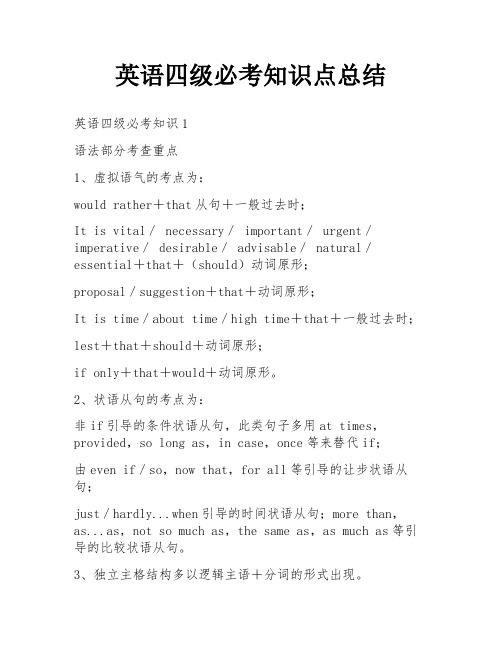
英语四级必考知识点总结英语四级必考知识1语法部分考查重点1、虚拟语气的考点为:would rather+that从句+一般过去时;It is vital/ necessary/ important/ urgent/imperative/ desirable/ advisable/ natural/essential+that+(should)动词原形;proposal/suggestion+that+动词原形;It is time/about time/high time+that+一般过去时;lest+that+should+动词原形;if only+that+would+动词原形。
2、状语从句的考点为:非if引导的条件状语从句,此类句子多用at times,provided,so long as,in case,once等来替代if;由even if/so,now that,for all等引导的让步状语从句;just/hardly...when引导的时间状语从句;more than,as...as,not so much as,the same as,as much as等引导的比较状语从句。
3、独立主格结构多以逻辑主语+分词的形式出现。
4、情态动词多与完成时形式连用。
5、定语从句重点考查介词+关系代词(which)和as作为关系代词。
英语四级必考知识2词汇部分考查重点1、动词、名词与介词的搭配如:popular/patient+with;yield/solution/adapt/transfer/access+to;accuse/require+of;charge+for;under+discussion等等。
2、习惯用法如:confess to/set about/be used to+doing;be supposed to/have/make sb.+do等。
3、由同一动词构成的短语如:e,go,set,break等构成的短语。
大学英语四级知识点
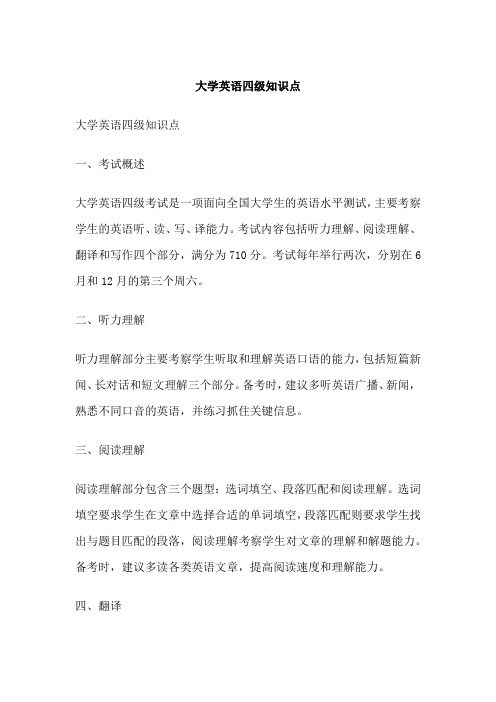
大学英语四级知识点大学英语四级知识点一、考试概述大学英语四级考试是一项面向全国大学生的英语水平测试,主要考察学生的英语听、读、写、译能力。
考试内容包括听力理解、阅读理解、翻译和写作四个部分,满分为710分。
考试每年举行两次,分别在6月和12月的第三个周六。
二、听力理解听力理解部分主要考察学生听取和理解英语口语的能力,包括短篇新闻、长对话和短文理解三个部分。
备考时,建议多听英语广播、新闻,熟悉不同口音的英语,并练习抓住关键信息。
三、阅读理解阅读理解部分包含三个题型:选词填空、段落匹配和阅读理解。
选词填空要求学生在文章中选择合适的单词填空,段落匹配则要求学生找出与题目匹配的段落,阅读理解考察学生对文章的理解和解题能力。
备考时,建议多读各类英语文章,提高阅读速度和理解能力。
四、翻译翻译部分考察学生将英文翻译成中文的能力。
备考时,建议积累词汇和语法知识,多练习翻译,培养语言转换能力。
五、写作写作部分要求学生根据给定的主题或情境写一篇文章。
备考时,建议多写多练,积累常用表达和句型,同时注意语法和拼写错误。
六、备考建议备考大学英语四级考试,建议制定合理的复习计划,充分利用历年真题进行模拟练习。
要保持良好的心态和信心,克服对考试的恐惧,注重基础知识的积累和语言能力的提升。
总之,大学英语四级考试是一项重要的英语水平测试,备考过程中要注重基础知识的掌握和实践能力的提升。
希望以上知识点能够帮助大家更好地备考,取得优异的成绩。
大学英语四级知识点汇总大学英语四级知识点汇总一、主题本文将汇总和解析大学英语四级考试的各类知识点,包括完形填空、阅读理解、写作等部分,以帮助考生全面了解四级考试的难点和策略。
二、完形填空完形填空是大学英语四级考试的重要部分,它要求考生在理解文章大意的基础上,选择合适的单词或短语来填充文本,使文章语法正确、意义完整。
1、词汇量:扩大词汇量是成功完成完形填空的关键。
考生需要熟练掌握常见单词和短语,了解近义词之间的区别,以便在考试时快速、准确地选择答案。
英语四级知识点总结(合集11篇)
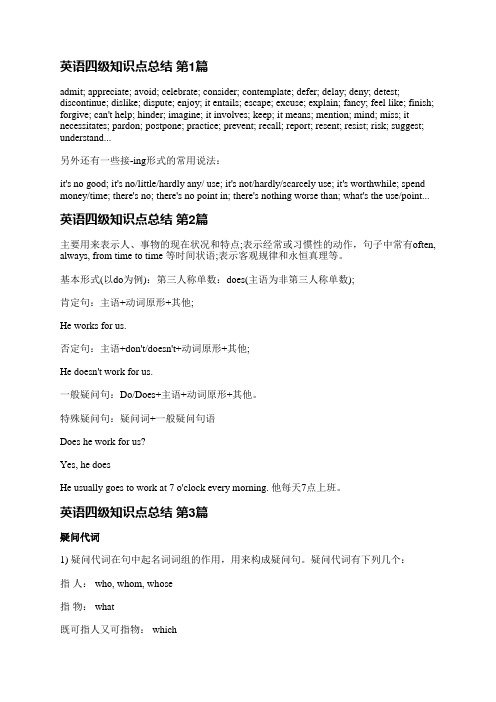
英语四级知识点总结第1篇admit; appreciate; avoid; celebrate; consider; contemplate; defer; delay; deny; detest; discontinue; dislike; dispute; enjoy; it entails; escape; excuse; explain; fancy; feel like; finish; forgive; can't help; hinder; imagine; it involves; keep; it means; mention; mind; miss; it necessitates; pardon; postpone; practice; prevent; recall; report; resent; resist; risk; suggest; understand...另外还有一些接-ing形式的常用说法:it's no good; it's no/little/hardly any/ use; it's not/hardly/scarcely use; it's worthwhile; spend money/time; there's no; there's no point in; there's nothing worse than; what's the use/point... 英语四级知识点总结第2篇主要用来表示人、事物的现在状况和特点;表示经常或习惯性的动作,句子中常有often, always, from time to time 等时间状语;表示客观规律和永恒真理等。
基本形式(以do为例):第三人称单数:does(主语为非第三人称单数);肯定句:主语+动词原形+其他;He works for us.否定句:主语+don't/doesn't+动词原形+其他;He doesn't work for us.一般疑问句:Do/Does+主语+动词原形+其他。
大学英语四级考试知识点

大学英语四级考试知识点一、听力1、英语听力技巧之——多听这里的多听,指的是集中注意力多听,而不是用耳朵进行不间断的扫描。
如果连续听太长时间,容易走神,而且也容易感到疲倦。
所以最好分段听,无间歇的听实在是效果不好。
而扫描听,就象我的一个朋友说的一样,听的时候要象一只警惕的小狐狸,竖着耳朵寻找宝藏。
2、英语听力技巧之——多练多练是提高英语听力水平的永恒真理。
我和很多语感很好的人说,其实英语也是可以不用做题就能考到好成绩的,但是毕竟语感不是每个人都拥有的。
而且在找不到语感之前,只有多做题这一条路可以选择了。
我一般除了课上的练习外,每天晚上都会用mp3下载听力真题,开始阶段的那些文章不知道反复听了多少遍,但是一直不放弃。
二、阅读理解1、大学英语四级考试阅读理解题型之——学会取舍,理解文章在考试的时候,时间不可浪费过多。
产生歧义的句子最好避而远之。
对于一些细节题,考生可以到原文中通过“顺藤摸瓜”的方式寻找答案。
考生可通过“略读”文章大概意思的方法,对短文有个初步认识,然后迅速研究一下短文后的问题,带着问题运用“跳读”的方法阅读全文。
这样可以很快确定解题所需信息,能有效的提高阅读效果。
考生一定要从细节处着眼,特别注意文章中的一些细微变化。
考生应当熟记在心的这些细节问题包括:时间、地点、人物、事实。
考生对某些细节含混模糊时,应有针对性的跳读其他相关部分,将有疑点的细节与文中细节一一比照,认真思考和琢磨推敲。
考生应该明白在阅读理解中处理好结构和内容的安排关系。
理解文章的过程其实就是处理好这些关系的过程。
处理好整体与局部的关系;过好词汇关,选词力争准确;判断推理忠实原文;根据上下文判断词义;表达准确无误。
2、大学英语四级考试阅读理解题型之——积累词汇词汇量是阅读的基础,有了词汇量就能很容易地进行阅读。
我们就拿中文举个例子:“李明是个优秀的的好学生”,这句话很简单,相信大家都能够看懂。
其中“优秀”和“好”都表示“很好”的意思,但是两者同时出现时只能用一个。
英语四级最全复习笔记及技巧共50页文档

41、学问是异常珍贵的东西,从任何源泉吸 收都不可耻。——阿卜·日·法拉兹
42、只有在人群中间,才能认识自 Байду номын сангаас。——德国
43、重复别人所说的话,只需要教育; 而要挑战别人所说的话,则需要头脑。—— 玛丽·佩蒂博恩·普尔
英语四级最全复习笔记及技巧
6、法律的基础有两个,而且只有两个……公平和实用。——伯克 7、有两种和平的暴力,那就是法律和礼节。——歌德
8、法律就是秩序,有好的法律才有好的秩序。——亚里士多德 9、上帝把法律和公平凑合在一起,可是人类却把它拆开。——查·科尔顿 10、一切法律都是无用的,因为好人用不着它们,而坏人又不会因为它们而变得规矩起来。——德谟耶克斯
44、卓越的人一大优点是:在不利与艰 难的遭遇里百折不饶。——贝多芬
45、自己的饭量自己知道。——苏联
- 1、下载文档前请自行甄别文档内容的完整性,平台不提供额外的编辑、内容补充、找答案等附加服务。
- 2、"仅部分预览"的文档,不可在线预览部分如存在完整性等问题,可反馈申请退款(可完整预览的文档不适用该条件!)。
- 3、如文档侵犯您的权益,请联系客服反馈,我们会尽快为您处理(人工客服工作时间:9:00-18:30)。
英语四级备考笔记目录一、英语四级写作高级替换词 (1)二、英语四级写作必备词 (2)三、英语四级作文常用短语30句 (2)四、大学英语四级作文高分句型汇总 (4)五、2017年12月英语四级作文范文50例带翻译 (7)六、翻译复习 (13)一、英语四级写作高级替换词1)good:好的perfect, excellent, outstanding, superior2)many:许多a lot of, a host of, a sea of3)some:一些quite a few , several4)think:认为acknowledge, hold the view that5)more and more:越来越多increasing, increasingly, growing6)helpful:有益的beneficial, rewarding7)bad:坏的wicked, dreadful, harmful8)customer:顾客consumer, client9)in my opinion:以我看来from my part, from my own perspective10)very:非常exceedingly, extremely11)cause:引起result in, be triggered by12)want:想要desire, be eager to13)remember:记住memorize, bear in mind that14)have:拥有own, possess15)poor:穷的needy, impoverished16)rich:富的wealthy, affluent17)excellent:棒的fabulous, marvelous18)obvious:明显的apparent, evident19)healthy:健康的robust, wholesome20)surprising:惊人的amazing, miraculous21)beautiful:美的attractive, gorgeous, eye-catching22)popular:流行的prevailing, prevalent23)improve:提高enhance, promote, boost24)solve:解决resolve, tackle, cope with, deal with25)develop:培养cultivate, foster, nurture26)complete:完成fulfill, accomplish, achieve27)keep:保留hold, preserve, retain28)energetic:有活力的dynamic, vigorous29)destroy:破坏damage, ruin30)influence:影响impact, the effect of…31)pollute:污染taint, contaminate二、英语四级写作必备词 1) 大多数人most people→the majority of the population 2) 经常often→frequently 3) 我相信I believe→from my standpoint, from my personal perspective 4) 必须must→it is a must for us to… 5) 知道know→be aware of 6) 因为because→in that 7) 最后at last→eventually 8) 然而but→however 9) 如果if→provided that 10) 各行各业的人all kinds of people→people from all walks of life 11) 引起,导致lead to→contribute to 12) 人people→individuals 13) 好的good→desirable, beneficial 14) 坏的bad→undesirable 15) 很多many→numerous 16) 越来越more and more→a(n) increasing/mounting number of 17) 很very→extremely 18) 方面side→aspects 19) 表明show→demonstrate, indicate 20) 利用use→utilize 21) 因此/结果so→therefore 22) 部分part→proportion 23) 提高improve→enhance 24) 改变change→transform 25) 强调/重视emphasize→attach great importance to 26) 培养develop→cultivate 27) 破坏destroy→undermine 28) 解决deal with →tackle /figure out 29) 普遍的everywhere→universal 30) 明显的obvious→apparent 31) 在当今社会in the modern society→in the current society32) 使make→enable三、英语四级作文常用短语30句 1.随着经济的快速发展with the rapid development of economy 2.人民生活水平的显著提高/ 稳步增长 the remarkable improvement/ steady growth of people's living standard 3.先进的科学技术advanced science and technology 4.面临新的机遇和挑战be faced with new opportunities and challenges 5.人们普遍认为It is commonly believed/ recognized that… 6.社会发展的必然结果the inevitable result of social development 7.引起了广泛的公众关注arouse wide public concern/ draw public attention 8.不可否认It is undeniable that…/ There is no denying that… 9.热烈的讨论/ 争论a heated discussion/ debate 10.有争议性的问题a controversial issue 11.完全不同的观点a totally different argument 12.一些人…而另外一些人… Some people… while others… 13.就我而言/ 就个人而言As far as I am concerned, / Personally, 14.就…达到绝对的一致reach an absolute consensus on… 15.有充分的理由支持be supported by sound reasons 16.双方的论点argument on both sides 17.发挥着日益重要的作用play an increasingly important role in… 18.对…必不可少be indispensable to … 19.正如谚语所说As the proverb goes: 20.…也不例外…be no exception 21.对…产生有利/不利的影响exert positive/ negative effects on… 22.利远远大于弊the advantages far outweigh the disadvantages. 23.导致,引起lead to/ give rise to/ contribute to/ result in 24.复杂的社会现象a complicated social phenomenon 25.责任感/ 成就感sense of responsibility/ sense of achievement 26. 竞争与合作精神sense of competition and cooperation 27. 开阔眼界widen one's horizon/ broaden one's vision 28.学习知识和技能acquire knowledge and skills 29.经济/心理负担financial burden / psychological burden 30.考虑到诸多因素take many factors into account/ consideration四、大学英语四级作文高分句型汇总 文章开头句型 适用于有争议性的主题 2018年6月大学英语四级作文高分句型:对立法 2018年6月大学英语四级作文高分句型:现象法 2018年6月大学英语四级作文高分句型:观点法 2018年6月大学英语四级作文高分句型:引用法 文章中间主体内容句型 原因结果分析 2018年6月大学英语四级作文高分句型:基本原因 2018年6月大学英语四级作文高分句型:另一原因一、英语四级作文高分句型:意义性 2--6 意义性的结尾方式--------> 文章结尾的时候,从更高的更新的角度指出所讨论的问题的重要性以及其深远的意义! [1]. Following these suggestions may not guarantee the success, but the pay off might be worth the effort . It will not only benefit··· but also benefit ..... [2]. In any case, whether it is posotive or negative, one thing is certain that it will undoubtedly ....二、英语四级作文高分句型:方向性 2-5 方向性的结尾方式---- 其与建议性的唯一差别就是对问题解决提出总的, 大体的方向或者指明前景. [1]. Many solutions are being offered here , all of them make some sense, but none is adequate enough. The problem should be recognized in a wide way . [2]. There is no quick method to the issue of .., but .. might be helpful/benefical. [3]. The great challenge today is ...... There is much difficulty , but ........三、英语四级作文高分句型:建议性 2-4 建议性-------- 对所讨论的问题提出建议性的意见, 包括建议和具体的解决问题的方法 [1]. While it cannot be solved immediately, still there are ways. The most popular is .... Another method is ... Still another one is ..... [2]. Awareness/Recognition of the problem is the first step toward the situation.四、英语四级作文高分句型:号召性 2-3 号召性-------- 呼吁读者行动起来, 采取行动或提请注意想及观点 [1]. It is time that we urged an immediate end to the undesirable tendency of···· [2]. It is essential thar effective measures should be taken to correct the tendency.五、英语四级作文高分句型:后果性 2-2 后果性------ 揭示所讨论的问题若不解决, 将产生的严重后果. [1]. We must call for an immediate method , because the current phenomenon of ... , if allowed to proceed, will surely lead to the heavy cost of ....... [2]. Obviously , if we ignore/are blind to the problem , there is every chance that .. will be put in danger.六、英语四级作文高分句型:结论性 2-1 结论性--------- 通过对文章前面的讨论,引出或重申文章的中心 [1]. From what has been discussed above, we may easily draw the conclusion that ..... [2]. In summary , it is more valuable .......七、英语四级作文高分句型:两者比较 3-2-1. 两者比较---> 比较两事物, 要说出其一超过另一个, 或肯定一事物的优点, 也肯定其缺点的时候用 [1]. The advantages gained from A are much greater than the advantages we gain fromB. [2]. Indeed, A carries much weight重要度)when compared with B. [3]. There is no doubt that it has its negative effects as well as positive effects.八、英语四级作文高分句型:两者相同 3-2-2 . 两者相同/相似------> 比较两事物共同都有或者共同都没有的特点时用! [1]. A and B have several thing in common. They are similar in that..... [2]. A bears some striking(显著的) resemblance(s)( 相似性) to B.九、英语四级作文高分句型:后果影响 后果影响------分析某事物可能造成的后果或者带来的影响 . [1]. It will produce a profound impact on.... [2]. In involves some serious consequence for ........十、英语四级作文高分句型:另一原因 另一原因--------> 在分析了基本原因之后, 再补充一个次要的或者更重要时用! [1]. Another important factor is .... [2]. ... is also responsible for the change/problem. [3]. Certainly , the ... is not the sole reason for .....十一、英语四级作文高分句型:基本原因 基本原因--- 分析某事物时, 用此句型说明其基本的或者多方面的原因. [1]. The answer to this problem invovles many factors. For one thing... For another...... Still another ... [2]. A number of factors , both physical and psychological affect .... /both individual and social contribute to ....十二、英语四级作文高分句型:引用法 先引出名人名言或者有代表性的看法, 来引出文章要展开论述的观点 [1]. "Knowledge is power." such is the remark made by Bacon.This remark has been shared by more and more people . "Education is not complete with graduation.(学无止境)" Such is the opnion of a great American philosopher. Now more and more people share his opnion. [2]."........." How often we hear such statements like thoses /this . In our own days we are used to hearing such traditional complains as this "......"十三、英语四级作文高分句型:观点法 开门见山,直接了当地提出自己对要讨论的问题的看法. [1]. Now people in significant numbers are coming to realize that... [3]. Now there is a growing awareness of the necessity to......Now people become increasingly conscious of the importance of ...... [4]. Perhaps it is time to have a fresh look at the attitude that.......十四、英语四级作文高分句型:现象法 引出要剖析的现象或者问题, 然后评论 [1]. Recently the rise inphenomenon of ... has aroused public worldwide concern. [2]. Recently the issue of the problem of ...has been brought into focus. [3].Inflation(通货膨胀)/Corruption(贪污腐败)/Social inequality(不平等) ... is yet another of the new and bitter truth we have to learn to face constantly.十五、英语四级作文高分句型:对立法 先引出其他人的不同看法,然后提出自己的看法或者偏向于某一看法, [1]. When asked about....., the vast majority of people say that ....... But I view a bit differently. [2]. When it comes to .... , some people bielive that ....... Others claim that the opposite is true . There is probably some truth in both arguements, but I tend to the latter(后者;(二者中)后者的) ...[3]. Now, it is commonly acknowledged that .... They claim that ... But I wonde r whether.....五、2017年12月英语四级作文范文50例带翻译 Directions:For this part, you are allowed 30 minutes to write a composition on the topic Long Holidays. You should write at least 120 words following the outline given below in Chinese: 一、 1. 长假给大学生带来的好处 2. 长假可能给大学生带来的问题 3. 我应当怎样利用好长假 【范文】 Long Holidays Generally speaking, long holidays are good for us college students. On the one hand, we have a lot of time to study by ourselves and thus improve weaknesses and further develop strengths. On the other hand, we can take part-time jobs, which can make us realize responsibility and make ourselves better prepared for social life. But every coin has two sides. Some students fail to make good use of their time and they are addicted to various computer games. I am afraid that they are likely to ruin themselves in this way. As far as I am concerned, I will try to make the best use of my precious time. I will spend most of my holidays studying English for that I am very poor at it. In addition, I will take a part-time job as private teacher. By this means, I can earn some money and put my knowledge into practice as well. 长假期 一般来说,长假期是对我们有益的大学生。
